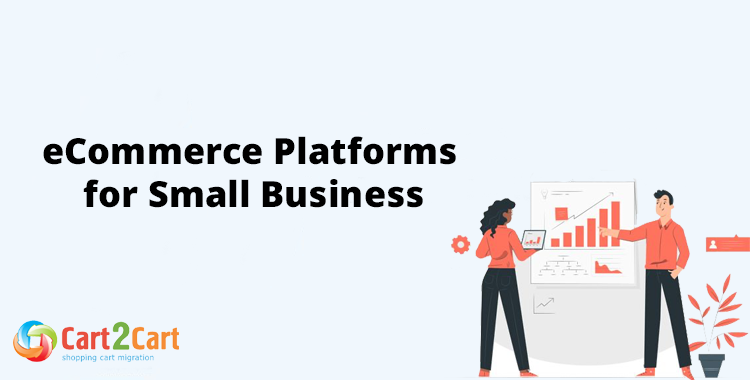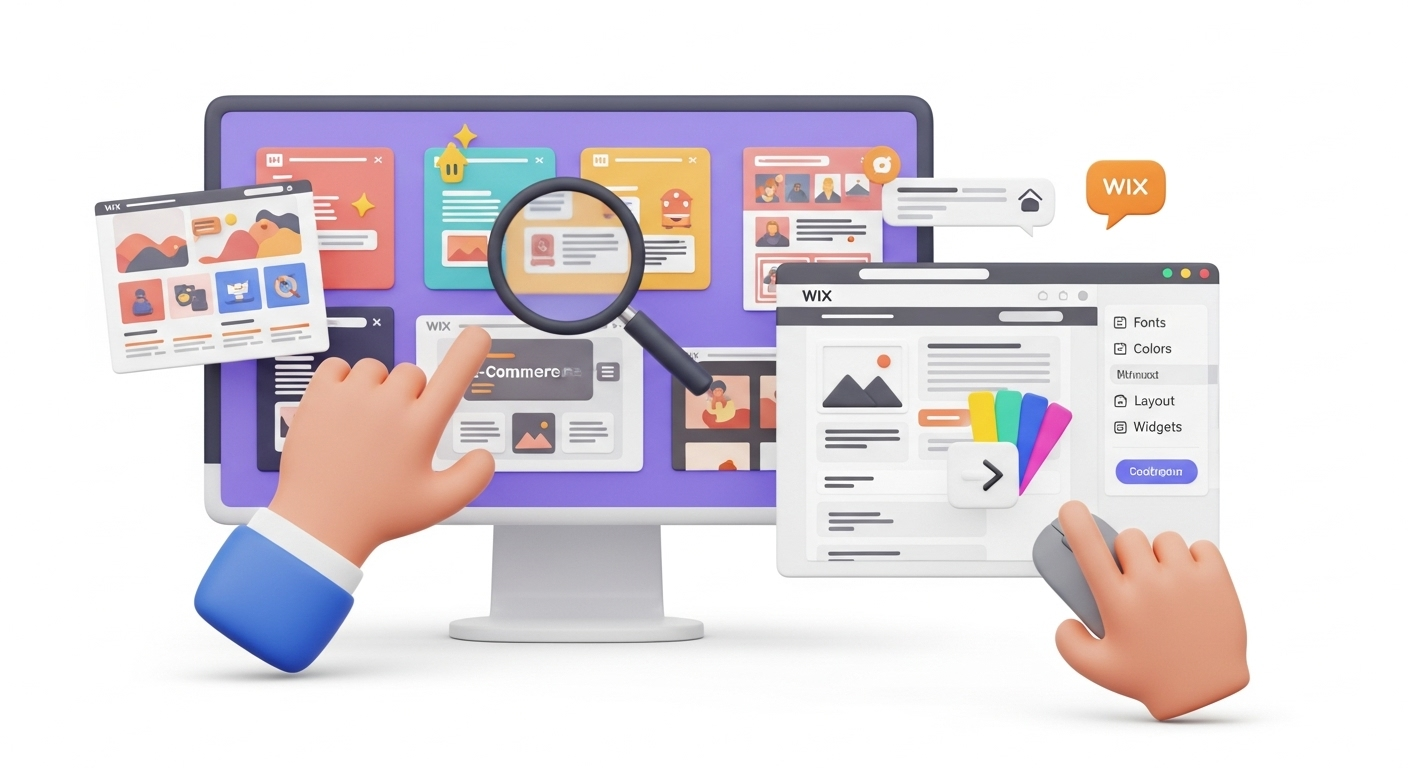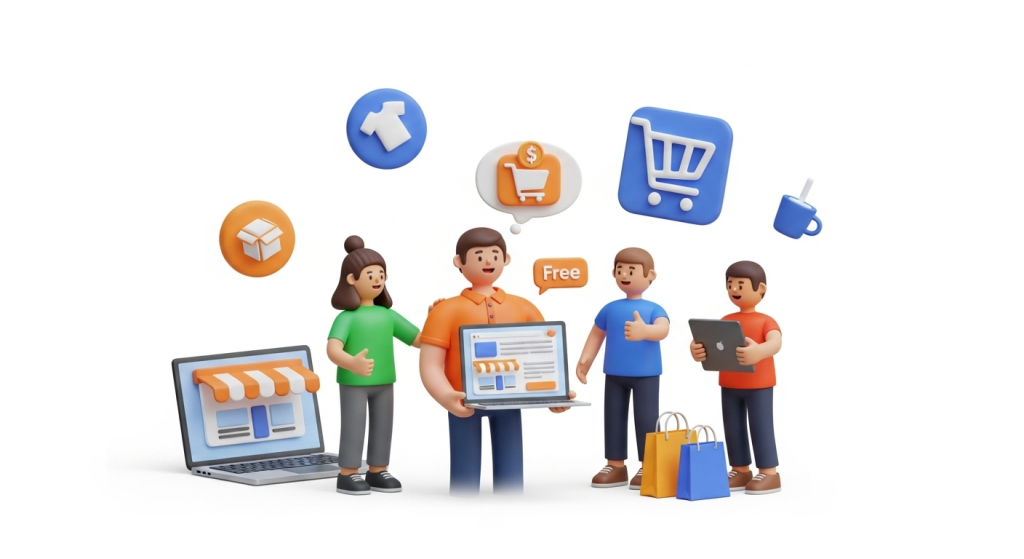For small business owners, an e-commerce platform is a necessity for establishing a digital presence and expanding customer reach. It's the foundation of your online operations, enabling you to showcase products, process transactions, and engage with customers. With many options available, choosing the right one is a critical decision that directly impacts your success and growth potential.
This guide will help you select the perfect e-commerce platform by exploring key factors and providing insights into the best options for small businesses. This will give you the knowledge to make an informed decision that aligns with your business goals and sets you on the path to digital success.
Importance Of Choosing The Right eCommerce Platform
Selecting the right eCommerce platform is crucial for success. Here’s why:
- User Experience: A user-friendly platform improves customer satisfaction and sales.
- Functionality: Essential features like inventory management, payment gateways, and marketing tools streamline operations.
- Scalability: The platform should grow with your business. Consider a pre-migration checklist.
- Customization: Align your online store with your brand image.
- Mobile Responsiveness: A mobile-optimized platform is essential for reaching a wider audience.
- SEO Friendliness: SEO support improves online visibility and drives organic traffic.
- Security: Robust security protects customer data and builds trust.
- Integration Capabilities: Integration with third-party apps like CRM or accounting software enhances operations.
- Support and Updates: Reliable support ensures you have assistance and access to the latest features.
How To Choose The Best Platform For Small Business?
When choosing a platform, consider these factors:
- Ease of Use: A user-friendly interface helps you get your store online quickly.
- Budget: Understand the full pricing structure, including any additional fees.
- Customization: Look for customizable templates to reflect your brand.
- Integrations: Ensure the platform connects with essential third-party marketing, shipping, and analytics tools.
- Payment Processors: The platform should support popular and secure payment gateways.
- Security: Prioritize platforms with strong security measures like SSL certificates.
- Customer Support: Reliable support via live chat, email, or phone is crucial.
Best eCommerce Platforms For Small Business
We've evaluated the top platforms based on performance, ease of use, features, design, integrations, and value to help you decide.
Shopify
Shopify is a top choice for small businesses seeking an easy setup. It's designed specifically for eCommerce, offering fast performance and handling technical aspects like hosting. Pricing starts at $39/month. Setup is straightforward, with a variety of free and premium themes. Shopify includes a built-in blog, inventory management, and integrates with major marketplaces. Its vast app market offers numerous third-party applications to extend functionality.
Pros
- User-friendly interface and easy setup.
- Scalable plans for growth.
- No transaction fees with Shopify Payments.
- Great for small stores, dropshipping, and print-on-demand.
Cons
- SEO features could be improved.
- Some essential features require paid third-party apps.
BigCommerce
BigCommerce is a leading platform with plans from around $39 to several hundred dollars per month, all offering unlimited products and no transaction fees. It provides a strong mobile experience but can have slower loading times. The interface is user-friendly for all skill levels, with high-quality, mobile-responsive themes. All plans include SEO tools and drop shipping capabilities, but advanced features like abandoned cart emails require higher-tier plans.
Pros
- Seamless multi-channel selling (Amazon, eBay, etc.).
- Strong SEO performance.
- No transaction fees.
Cons
- Limited free themes.
- Advanced features are only in higher-priced plans.
- Selling limits on each plan can force upgrades.
WooCommerce
WooCommerce is a free, open-source WordPress plugin. You'll need your own hosting, domain, and SSL certificate. It requires more technical setup but offers maximum flexibility and customization. If you're familiar with WordPress, it's a powerful choice. Its functionality can be expanded with countless free and paid extensions, and it integrates with popular payment gateways. If you are considering migrating to WooCommerce, our guides can assist.
Pros
- Excellent SEO capabilities via WordPress.
- Large community of developers for support.
- Flexible cost management based on your needs.
Cons
- Quality hosting can be expensive.
- Lacks dedicated customer support.
- Basic functions often require paid extensions.
Wix
Wix is a beginner-friendly website builder with a drag-and-drop eCommerce platform. It offers hundreds of templates and a large app market. Wix includes marketing features, product zoom, and an AI-powered design assistant (ADI). It has its own payment gateway, Wix Payments, and supports over 50 others, with 24/7 support available.
Pros
- Beginner-friendly with 120+ store templates.
- AI-based design suggestions.
- hundreds of app integrations.
- Includes free ad vouchers and SSL certificate.
Cons
- The free plan does not support payment processing.
PrestaShop
PrestaShop is a free, open-source eCommerce platform, also available in a more restrictive cloud-based version. It offers thousands of mobile-responsive themes, though most are paid. Customization is possible with a WYSIWYG editor, but significant changes may require a developer. For a smooth PrestaShop migration, consider these tips. It has a large marketplace for add-ons, but many are costly, and compatibility between different third-party modules can be an issue.
Pros
- Offers both cloud-based and self-hosted solutions.
- Facilitates international selling.
Cons
- Quality hosting and necessary add-ons can be expensive.
- Limited free themes.
- The cloud version has significant limitations.
Squarespace
Squarespace is known for its visually stunning, professionally designed templates. All designs are mobile-optimized. The platform includes features like product reviews and single-page checkout, though some are exclusive to higher-tier plans. It offers a Video Studio app for creating marketing videos and provides 24/7 support via email and social media.
Pros
- numerous visually stunning eCommerce templates.
- Built-in video creation app.
- Unlimited bandwidth, storage, and products.
- Free SSL certificate and 14-day free trial.
Cons
- The cheapest plan has a 3% transaction fee.
- Marketing and integration options can be limited.
Weebly
Weebly, owned by Square, is a simple website builder with eCommerce capabilities. It has a user-friendly interface and basic drag-and-drop tools. It offers essential features like email marketing and SEO tools, with an app center for more integrations. Payments can be processed through Square or other providers, and 24/7 support is available.
Pros
- hundreds of integrations available.
- Built-in email marketing and SEO tools.
- Includes $100 in Google Ads credits and a free SSL certificate.
Cons
- Limited customization options.
- The cheapest plan lacks key features like inventory management.
What difference does an eCommerce platform bring into your business?
A reliable eCommerce platform offers several advantages:
- Decreased Costs: Streamlined inventory and management processes reduce operational costs.
- Customer Insights: Marketing analytics provide valuable data on customer behavior.
- 24/7 Sales: An online store is always open, generating revenue around the clock.
- Scalability: A good platform can grow with your business.
- Streamlined Management: Integrated tools for inventory, orders, and payments simplify operations.
Factors to consider when choosing the best eCommerce platform
To choose the right platform, consider your:
- Business Size & Stage: Ensure the platform fits your current size and can scale for future growth.
- Platform Fees: Assess all costs, including monthly fees and transaction charges.
- Online and Offline Presence: If you have a physical store, you'll need POS integration.
- Product Range: The platform should handle your specific product types and inventory size.
- Target Market: Consider features like multi-currency support if you sell internationally.
- Marketing Budget: Some platforms offer built-in marketing tools.
- Technical Expertise: Choose a platform that matches your technical skill level.
FAQs
What is the best eCommerce platform for small businesses?
Shopify is often considered the best for its user-friendliness, comprehensive tools, and affordable plans starting at $39/month.
Which platform should I use for my small business?
Shopify or Wix are great for beginners due to their easy-to-use drag-and-drop builders and 24/7 support.
Which eCommerce platform is the cheapest?
While not detailed above, platforms like Zyro offer very affordable plans, with essential eCommerce tools.
Conclusion
Choosing the right e-commerce platform is a crucial decision for your small business. There's no single best option, but by aligning a platform's features with your specific needs, budget, and growth plans, you can find the right fit. Take time to evaluate your needs, use free trials, and make an informed decision to set your business up for success. Shopify, BigCommerce, WooCommerce, Wix, and the other platforms listed here provide solid foundations for building a successful online store. Take time to evaluate your needs, use free trials, and make an informed decision to set your business up for success.
Monthly Update – January 2026
As we step into January 2026, the e-commerce landscape for small businesses is increasingly defined by personalized customer journeys and advanced data analytics. This month's focus should be on leveraging AI-driven tools to enhance both customer engagement and operational efficiency. Consider implementing AI chatbots for instant customer support, which can significantly improve response times and customer satisfaction. Furthermore, utilizing AI-powered recommendation engines is crucial for suggesting products based on individual browsing history and purchase patterns, leading to higher conversion rates and average order values. It’s also essential to review your analytics thoroughly to identify key trends and consumer behaviors from the past year, allowing you to optimize inventory management, refine marketing campaigns, and tailor product offerings more effectively. Small businesses that strategically embrace these technological advancements will be better positioned to differentiate themselves from competitors, build stronger customer loyalty through hyper-personalization, and ultimately drive sustainable growth in an ever-evolving and competitive market. Now is also a prime time to audit your current platform's performance and scalability, ensuring it can seamlessly support future innovations and increased traffic without compromising the critical user experience.
For more details, explore our FAQ section or schedule a call with a migration expert.











Comment by Dai software
Hey, very nice site. I came across this on Google, and I am stoked that I did. I will definitely be coming back here more often. Wish I could add to the conversation and bring a bit more to the table, but am just taking in as much info as I can at the moment. Thanks for sharing.
Comment by Natalia Tsal
We are glad that you like our blog. Please do come back for more useful information!